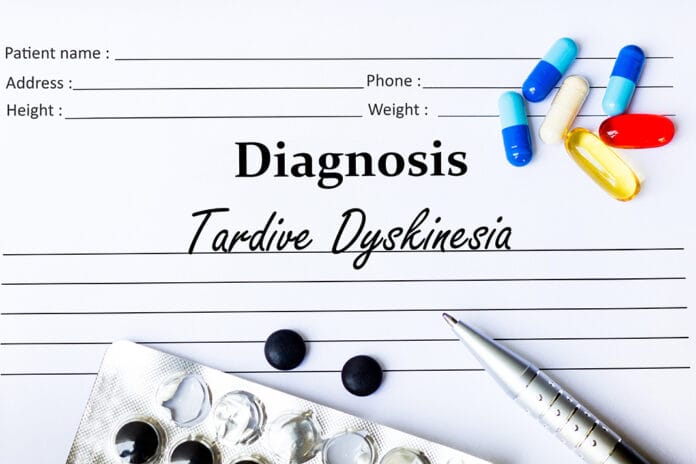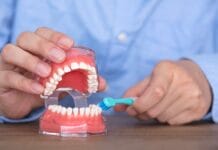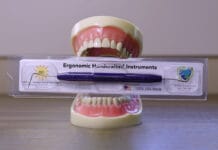Tardive dyskinesia (TD) is a serious side effect from the long-term use of certain antipsychotic drugs used to treat mental illness. TD may present itself with uncontrolled, continuous jerking movements of the face, tongue, and jaw, as well as other body parts.1 These movements are uncontrolled by the patient and may appear as though they are gnashing their teeth (like a cow chewing cud) or continuously chewing gum.1 TD may also cause the patient to appear as though they are always frowning.
Tardive dyskinesia can present itself orally in the dental chair as extreme wear from years of uncontrolled gnashing and grinding of teeth, causing excessive occlusal wear, reduction of structure, and fracturing enamel. A very close family member suffered from TD for years before it started taking a toll on her teeth. I can attest to the severity of the gnashing and uncontrolled grinding that her medicine caused.
Social Impact of Tardive Dyskinesia
Her most beautiful smile was slowly demolished from the abusive side effects of (in her case) aripiprazole. The years of extensive, uncontrolled jaw movements (back and forth as well as circular) also became a social frustration for her and the family. Since she was unable to control her jaw, it affected her ability to properly and efficiently swallow food, which left her forever chewing without adequately swallowing.
This is a very frustrating problem when you like to socialize at the dinner table but always have food in your mouth or appear to still be chewing. Her TD also tended to make her appear as though she was frowning a lot.
This extreme condition led to her inability to easily and properly be suctioned during intubation on her deathbed since her jaw was so accustomed to being clenched down. The forcefulness of the medical staff trying to suction the back of her throat was aggressive and no doubt painful. We’ll just leave it to that.
Making the Connection
Recently, a new patient presented with extreme wear and cupped occlusals. His chief complaint was that he looked in the mirror three years ago and realized that he could no longer even see his upper teeth. It apparently was quite traumatic to him as he had no idea that his wear had gotten so extreme.
While sleuthing over his medical history, the amount of dosages of antipsychotic medications came to my attention (one of which was also aripiprazole). We discussed his medical history some more and learned that he has been on these types of medications for over 20 years. He noticed that in the last eight to 10 years, he had uncontrolled jaw movements. However, no one ever connected the dots with him. I am not sure that I would have noticed any connection between his antipsychotic medications and his severe wear if I had not already had TD on my radar.
He is now in the situation of extreme and costly dentistry to rebuild his smile while also creating function. A challenge, to say the least. Despite his extreme loss of enamel and vertical dimension, he is thankful for these medications because they have given him a healthier mental state of being. Perhaps catching the connection earlier could have saved him enamel, time, money, embarrassment, and grief.
According to a recent PubMed study, approximately 16% to 50% of patients on antipsychotic medications exhibit signs of TD; this estimate, however, may be an underestimation.2
That being said, it is important to help connect the dots for our patients who are on antipsychotics, so early intervention in preventing tooth and enamel loss is possible. Consider how important a bite splint can be to a patient who has uncontrolled jaw movements. Consider also suggesting to the patient that they discuss with their medical doctor (psychologist/psychiatrist) the extent to which their TD is affecting their oral and social health. Perhaps an alternative medication could serve to help them without such potentially permanent side effects.
Medications to Monitor
The two examples above are familiar to me. However, there is a whole list of medications that could have these unwanted TD side effects. Some of the more familiar are listed below.
Older antipsychotic medications with potential TD side-effects include:3
- Chlorpromazine
- Fluphenazine
- Haloperidol
- Perphenazine
- Prochlorperazine
- Thioridazine
- Trifluoperazine
Although newer medications are less likely to contribute to TD, they are not without their risks.
Other drugs that can cause TD include:3
- Metoclopramide (treats gastroparesis, stomach problem)
- Antidepressant medicines such as amitriptyline, fluoxetine, phenelzine, sertraline, trazodone
- Anti-Parkinson medicines such as levodopa
- Antiseizure medicines such as phenobarbital and phenytoin
Dental hygienists are not expected to connect the dots to every ailment and know the side effects of every medication that our patients are on. However, perhaps someone reading this article may have an “aha” moment with a dear patient and be able to suggest a possible connection. Perhaps an early intervention (when tooth wear coincides with TD-like jaw movements and a history of antipsychotic medications) could help keep a smile healthy or could inhibit a life of chronic TD before excessive permanent damage occurs. Sleuthing over medical histories and observing our patient’s reactions and interactions, and relating this to the dentist and patient is solid proof that hygienists are not just “tooth scalers.”
Need CE? Click Here to Check Out the Self-Study CE Courses from Today’s RDH!
Listen to the Today’s RDH Dental Hygiene Podcast Below:
References
- Dadiomov, D. (2019, March). Tardive Dyskinesia. National Alliance on Mental Illness. Retrieved from https://www.nami.org/About-Mental-Illness/Treatments/Mental-Health-Medications/Tardive-Dyskinesia
- Loughlin, A.M., Lin, N., Abler, V., Carroll, B. Tardive Dyskinesia Among Patients Using Antipsychotic Medications in Customary Clinical Care in the United States. PloS One. 2019; 14(6): e0216044. Retrieved from https://pubmed.ncbi.nlm.nih.gov/31163035/
- Tardive Dyskinesia. (2021, November 2). Retrieved from https://medlineplus.gov/ency/article/000685.htm












